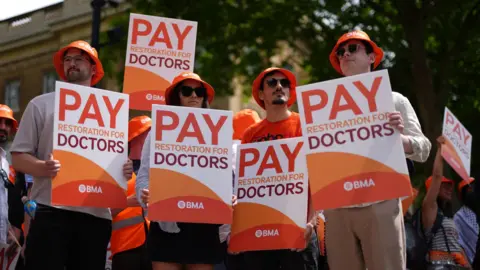**Health Secretary’s Regret Ahead of Resident Doctors’ Strike**
In a significant development within the UK healthcare system, Health Secretary Wes Streeting has expressed deep regret over the ongoing tensions that have led to a strike by resident doctors, previously referred to as junior doctors. This statement was made in a letter directed at these medical professionals just before their anticipated strike action is scheduled to commence.
Streeting’s remarks highlight a growing schism between governmental authorities and health professionals represented by the British Medical Association (BMA). He remarked that he felt the BMA representatives did not engage with him in good faith during negotiations aimed at averting the strike. The upcoming labor action, which is set to begin at 07:00 BST on Friday, is seen as a culmination of discontent surrounding pay and working conditions for the over 40,000 staff who are resident doctors in England.
The BMA, in turn, expressed its regret that a strike had become necessary, indicating that doctors prefer to avoid confrontational measures like strikes. They emphasized that the walkouts reflect genuine grievances over pay that they have felt compelled to address through industrial action. Acknowledging the implications of this strike, the BMA reassured patients that those requiring emergency care should continue to seek medical attention as usual.
In the letter dated Thursday, Streeting reaffirmed that strike actions should invariably be considered a last resort. However, he conveyed that while he could not move forward with any additional pay provisions, he remained open to discussions regarding improvements in work conditions and career advancement opportunities for resident doctors.
From August this year, there is slated to be a pay increase of 5.4% for resident doctors, following a substantial prior increase of 22% over the preceding two years. Despite this, the BMA maintains that real wages are approximately 20% lower than they were in 2008, arguing that a return to the pay levels of 17 years ago is necessary to address ongoing erosion of their compensation.
Streeting defended the proposed pay hike as the most substantial in the public sector for resident doctors and noted that negotiations held between July 8 and July 19 included discussions about enhancing the structure of training pathways, mitigating costs associated with training, and improving the overall work experience for resident doctors.
He underscored the government’s commitment to discuss issues surrounding training costs and potential enhancements in the creation of further training positions, yet lamented that the BMA had opted to prioritize strike action over attempting to collaboratively find solutions that could enhance the working lives of doctors.
As this situation unfolded, negotiations between the government and BMA had deteriorated by Tuesday, signaling a deeper impasse as talks focused on additional financial support for costs related to exams and equipment were rebuffed.
Dr. Tom Dolphin, a leader within the BMA, stated that strikes had become a regrettable necessity. He acknowledged the potential for improved dialogue that could avert these walkouts but emphasized that the failure to rectify the diminishing value of doctors’ pay compelled the current actions.
Even with the looming strike, NHS England has urged senior doctors to step in and cover duties during the strike period, indicating concerns about how the planned walkout could impact patient care. NHS nationally has expressed aims to maintain a level of non-urgent care during this strike, though this has led to contention with the BMA, who believes it could jeopardize the quality of patient services.
Additionally, there are concerns from NHS managers about financial implications for this strike, suggesting that there are excessive pay demands for senior doctors covering shifts, further complicating the overarching narrative of strained resources within the NHS. Ultimately, the unfolding situation relates not only to the immediate steps these medical professionals will take but also highlights broader systemic issues within the UK’s healthcare service, sparking discussions around fair compensation and the sustainability of health services under current operational models.












